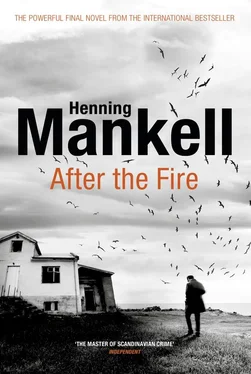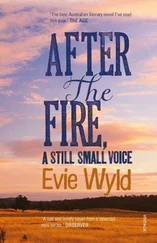It was on one of those footbath evenings that I hid under the table. I could hear the clink of wine glasses. Then I heard my mother say that she would really like me to have a brother or sister. I remember trembling inside. It had never occurred to me that I might have a sibling. I had always thought of myself as an only child, and I had expected the situation to remain unchanged. There was no need for any more children. When I heard my mother express her wish, I felt as if it wasn’t a sibling she hoped for; she wanted to swap me for another child. I was a failure, I wasn’t enough for them.
My father didn’t reply, but the wine glasses clinked once more. I realised I had to protect myself against my mother’s attack on me. I sank my teeth into her leg just above the shoe, and I bit her as hard as I could. She screamed and tried to pull her leg away, but I hung on. She got up, still screaming, knocking over her chair in the process, and dragged me out from under the table, where I was still clinging on. She was finally able to free herself. I remember looking at my father. He was holding his glass of red wine, his hand frozen on the way to his mouth. He was staring in surprise, or perhaps it was horror, at his son, who had blood all around his mouth like some repulsive vampire.
That was the only time my mother hit me. She did it not out of viciousness, but out of fear. I can understand how unexpected and frightening it must have been to be bitten on the leg while she was sitting quietly with her husband, enjoying a glass of wine.
I yelled out in pain and terror when she hit me, but I was most scared of being given away.
That evening I changed from being a child to something else, although I didn’t know what it was until many years later. I wasn’t a child, I wasn’t an adult, I was someone living in a land that didn’t exist. My mother felt guilty for the rest of her life because she had hit me, even though we never talked about it. Every time she looked at me, I could see that she was wondering whether I had forgiven her or not. When she died, all our questions remained unanswered. All I know today is that I never had a sister or brother. Perhaps my violent protest under the table played its part. My father spoke of it only once, when I was thirteen or fourteen years old. He had just been sacked from a restaurant where he had fallen out with the maître d’ over certain routines. He had applied for a new job at one of the restaurants in the Tivoli amusement park, and took me with him to Copenhagen. My mother had merely looked at him with heavy eyes when he announced that the family might be moving to Denmark.
When we arrived at Tivoli, we had an hour before he was due to meet the maître d’. It was May, warm when the sun was shining, chilly as soon as it went behind a cloud. We drank lemonade and shivered when the sun disappeared. Without any warning, he asked me about that evening when I had been sitting under the table: why had I bitten my mother? His tone was friendly, calm, almost tentative. He didn’t usually sound like that when he asked me questions; he might as well have been wondering what I would like to eat or drink.
I told him the truth: I had bitten her because I was scared that I was no longer enough for them.
He never mentioned the incident again. Years later I thought that perhaps he understood my reaction, that he felt the bite was somehow justifiable.
He didn’t get the job in Copenhagen. A few weeks later he started work at the restaurant in the central station in Stockholm and stayed there for six years, the longest he ever worked in the same place. Occasionally my mother and I would go for a meal when he was on duty. As I watched him hurrying from one table to another, I vowed I would never become a waiter.
I must have dozed off while I was thinking about my parents; I was woken by the sound of my phone ringing. I sat up in the darkness, alarmed by the noise of the phone inside the caravan.
It was a man, but I didn’t recognise the voice.
‘Fredrik?’
‘Yes?’
‘Just want to warn you.’
‘What about?’
‘You’re going to be arrested, possibly tomorrow.’
‘Who are you?’
‘A friend, perhaps. Or just someone who wants to warn you.’
He ended the call. I replayed the brief exchange in my mind; the voice was completely unfamiliar. I couldn’t decide whether it had been disguised or distorted in some way. Perhaps the man had put a handkerchief or his hand over the phone?
I was scared. My hands were shaking.
I didn’t sleep much that night. I was already up by the time dawn broke. I still didn’t know what to make of the phone call. I went out and took a dip in the ice-cold water. By the time I had dried myself and got dressed, I had made a decision. I had no intention of staying on the island, or on the skerry where my tent was. Nor was I planning to run away. I simply wanted to give myself time to understand what was happening around me.
A grey morning. Slight northerly breeze. Through the binoculars I could see that no one had moored a boat on the skerry. I tucked the money I had left in my jacket pocket and set off without bothering to lock the door of the caravan. The engine started right away. The last of the birds had migrated to warmer climes. I sailed to the harbour and moored at the far end of the inlet, where a half-submerged fishing boat had lain for many years. Fru Nordin had not yet arrived at the chandlery. The bread delivery van was parked outside the grocery shop. The cafe wasn’t open either.
I picked up my car from Oslovski’s. I could see that the tools were still strewn across the concrete floor but had been used. They were lying in different places, different combinations. Oslovski had been in there, working on her car.
I didn’t knock on her door, nor did I see any movement behind the closed curtains.
I drove away. You might say I had a plan, but whether it could be realised was something that no one, least of all me, was able to say with any certainty.
The three-storey building was in a residential area on the outskirts of the town. When I was a child there was nothing here but fields and meadows where cows grazed. The apartment blocks had been built in the 1960s, and looked exactly like all the others that had been erected in those days.
I parked outside the block closest to the edge of the forest. From the top floor I thought it would be possible to see the deep inlet leading out to sea.
It had been easy to find. I had called Directory Enquiries, and they had given me Lisa Modin’s address.
I ate in the restaurant at the bowling alley then went for a walk along the track by the inlet. Whenever I met anyone, I looked down at the ground. I had the feeling I might be recognised.
I didn’t get back to my car until about two o’clock. Someone had stuck a flyer under one of the windscreen wipers, informing me that cloudberries would be on sale in the square between twelve and two the following day. I wondered if there really were cloudberries so late in the year.
I could see the front door of Lisa’s apartment block. I checked out every window through my binoculars, but the curtains, potted plants and lamps gave me no clue as to which flat was hers.
I got out of the car and went over to the main door, which wasn’t locked. There was a list of residents’ names on a board to the left of the staircase; the building didn’t have a lift. Someone had scrawled GRINGO on a wall with a red marker pen; someone else had crossed it out and written JUNGLE BUNNY instead.
Lisa lived on the top floor. There were two apartments: Modin L. and Cieslak W. Should I go up and ring her doorbell now? No, it was too early in the day; I wanted to be sure she was in.
Читать дальше












